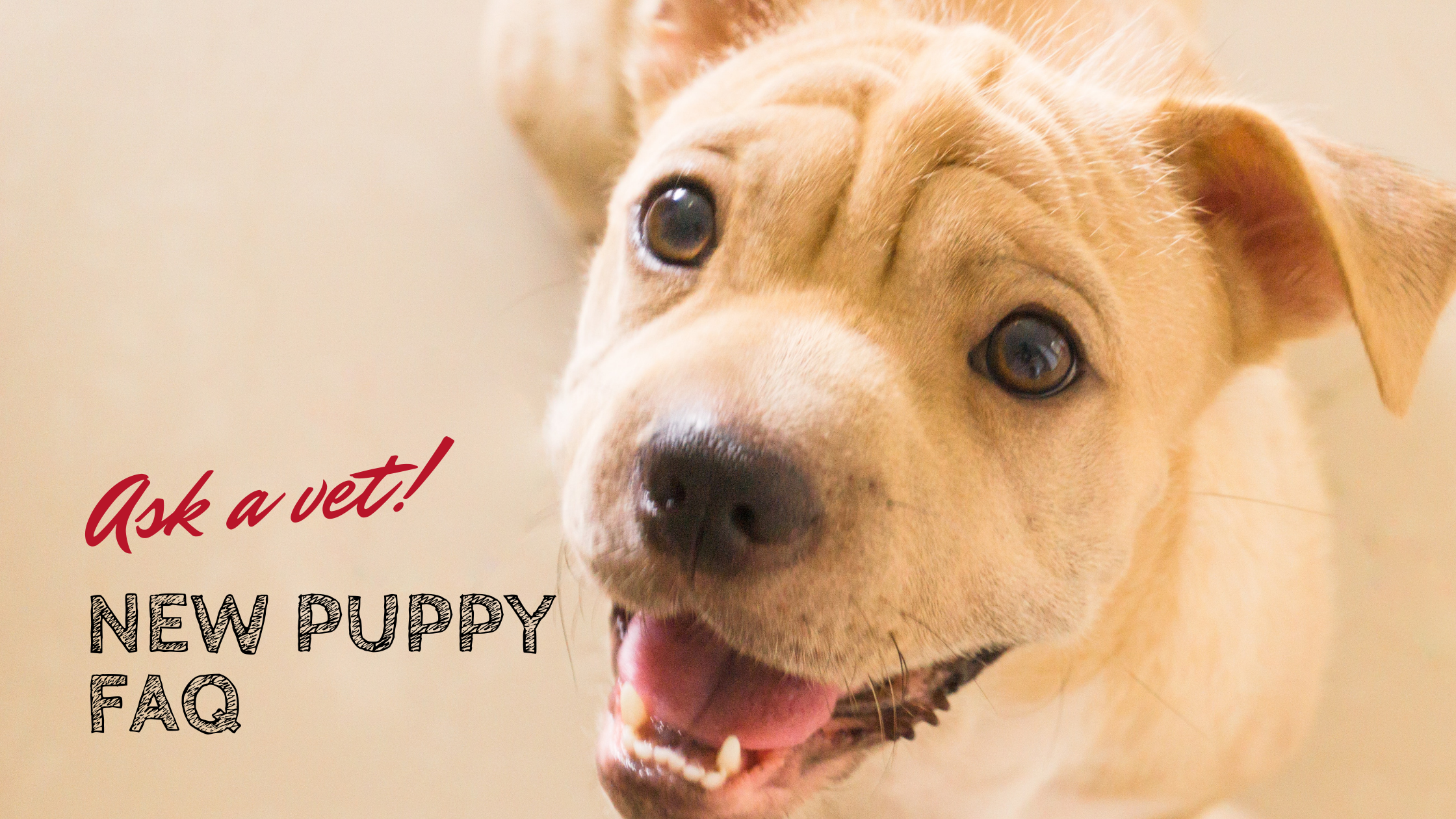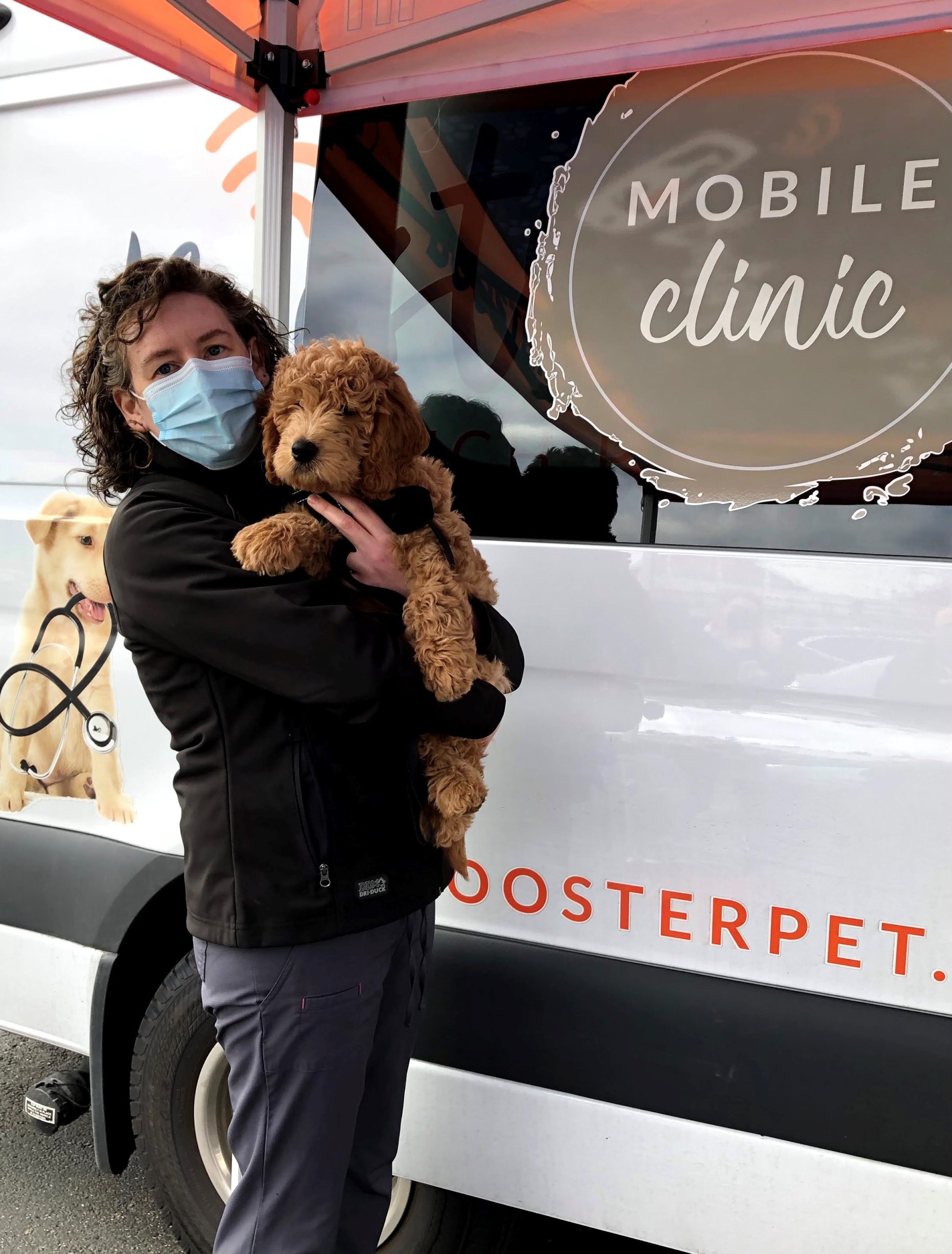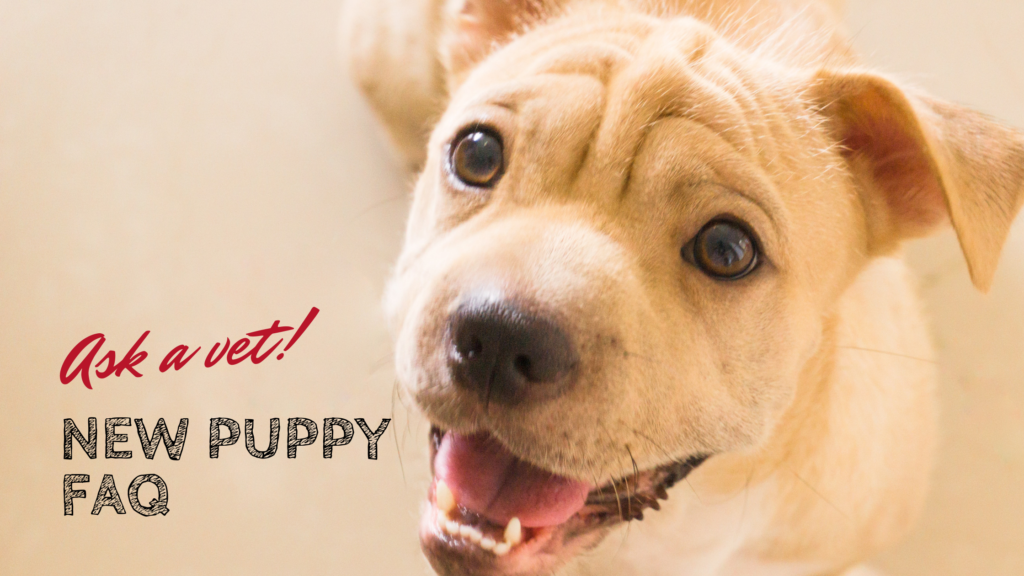
Tips and Tricks for Raising Happy, Healthy Puppies
If you are thinking about getting a new puppy or have a new puppy – congratulations! You are on your way to a lot of love…and a lot of questions. Dr. Kobi Johnson of BoosterPet answers some frequently asked questions and shares his favorite tips to make this journey as joyful and stress-free as possible. We hope this New Puppy FAQ helps you on your journey with your new pal!
Vaccinations
Which vaccinations do you recommend for puppies?
The cornerstone vaccines for puppies are the
Distemper/Parvovirus four-way combination vaccine (starting at eight weeks and given every three to four weeks until 16 weeks of age) as well as
Rabies (given at 16 weeks of age). Other vaccines to consider include:
- Bordetella, the vaccine that protects against kennel cough, for most dogs that leave the house, and is considered a core vaccine for any dog that visits the grooming salon, daycare, dog parks, or other social activities. Bordetella can be given as early as eight weeks and is generally good for one year.
- The Leptospirosis vaccine, given in a two-part series, protects against a bacterial infection that can lead to kidney failure. Leptospirosis spreads in the urine of infected animals and therefore thrives in watery areas such as the Pacific Northwest. We recommend it for most dogs that leave the house and consider it a core vaccine for puppies that will hike, camp, and have exposure to bodies of water. Leptospirosis can be spread from animals to humans and may be especially important in households with immunocompromised owners.
- Additional vaccines, such as Canine Influenza, Lyme, and Rattlesnake are location dependent and sometimes recommended for pets that travel outside Western Washington.
Why do puppies get a series of repeated vaccinations?
Puppies and kittens get maternal antibodies from their mothers, and the vaccinations that we administer for modern-day illnesses, such as parvovirus and kennel cough, compete against those maternal antibodies. To maximize immunity against these prevalent diseases, certain vaccines are given repeatedly as the immune system matures.
My puppy received vaccinations from the breeder. Do these count toward their vaccination series?
It’s possible, though the age of your pet when they received that first vaccine and how the vaccine is stored and handled plays a role in its viability. It may still be recommended to receive the full series from a veterinarian.
Food
What (and how much) should I feed my new puppy?
With so many brands and feeding philosophies out there, it is easy to become overwhelmed. We recommend a few keystone tips to ensure you are providing adequate nutrition:
- Feed the correct food for your pet’s life-stage. Young animals should be on a puppy formulation until roughly one year of age.
- Large breed dogs (typically anything with a projected adult weight over 45 lbs.) can benefit from a large-breed or high-energy formulation. These foods are formulated to prevent them from growing too quickly which could help reduce bone and joint diseases.
- Foods differ widely in nutritional density. When deciding how much to feed, start with the manufacturer recommendations provided on the bag or can, and then adjust from there. If your new furry friend is consistently gaining weight while maintaining a lean physique, then they are likely getting the right amount of food. When young, most of an animal’s nutrition goes to developing and strengthening their musculoskeletal system and therefore may appear lean during the first eight to ten months of age. That is ideal! We like lean puppies; there is no benefit later in life to having excess fat during the growing phase.
- If your new pet has a good appetite, is consistently gaining weight, shows minimal gastrointestinal upset (vomiting, diarrhea, gas), has good energy, and is not overly itchy, then they are on an appropriate diet.
How often should I feed my puppy? Is it okay to leave food out and let them graze?
We recommend feeding puppies three times daily until four to six months of age and then switching to twice daily if they have been gaining and maintaining weight appropriately. You will have had two to three vet visits during this time, and your veterinarian should be tracking their weight and advising if adjustments are needed. Feeding measured amounts at consistent times throughout the day is better than free-feeding, or leaving food out for them to graze on, for a couple of reasons:
- Firstly, many puppies cannot self-regulate their food intake, and are therefore prone to overeating. This can lead to obesity-related health problems for them and is more expensive for you!
- Secondly, providing pre-measured meals at specified times and then monitoring completion of that meal tells you how much your pet is consuming, so that you can adjust when needed.
- Third, it creates routine for them, which our pets crave, and can create moments throughout the day for you to connect and check-in with your pet.
- Fourth, many households contain multiple pets, and it is important your pet gets the food intended for them. Puppy food is high in fat and therefore a delicious, attractive option to your adult pets. We do not want your little one missing out on important nutrients and having to compete for food, thus reducing the risk of developing food aggression.
Spay or Neuter
How important is it to spay or neuter my pet?
There are few procedures more beneficial to your pet’s health and wellbeing than a spay (for females) or neuter (for males). If allowed to stay intact, your pet will face a higher risk of cancer, infection, and behavioral issues. We know anesthesia and surgical recovery seems scary to many; however, medical advancements have minimized anesthetic risks and thousands of these procedures are completed safely in the United States daily. These procedures have the potential to add years to your pet’s life!
At what age should I spay/neuter my pet?
For small breed dogs (with a projected adult weight under 45 lbs.) aim for procedure completion at six months of age. Large breed puppies (with a projected adult weight over 45 lbs.) we recommend procedure completion at nine to 15 months. This allows their musculoskeletal system to reach maturity, which research shows can reduce their risk of many orthopedic diseases, such as hip and elbow dysplasia.
Training
What are your favorite tips for potty training?
Patience, consistency, and positive reinforcement are key (avoid punishment for accidents and offer lots of opportunity for and praise when your pet eliminates appropriately). With these tenants, we rarely encounter dogs that continue to have inappropriate elimination. Often in these cases, we look for a medical or behavioral reason and provide support or solutions where we can. Crate training is an excellent tool as well, as puppies will avoid eliminating in the same space where they rest or play.
How important is crate training for my puppy?
Very! Crate training is not putting your puppy in jail. Instead, it is a wonderful way to provide your puppy with a safe space to call their own, and to provide some boundaries and practice healthy separation. It can also aid in potty training, as dogs will not typically eliminate in the same space as they are expected to rest or play. Crates should be the correct size: large enough that they can stand, sit, and turn around easily, but not so big that puppies can urinate or defecate in one corner and sleep comfortably in another corner. Also, puppies should never be placed in their crates as punishment. A dog that feels comfortable in a crate is beneficial for many things during the puppy stage but will also prove helpful later in life. We highly recommend it!
At what age can I introduce my puppy to social events such as daycare and play groups?
We understand that your puppy has a lot of energy to burn, and that it may be tempting to watch them play with others for a few hours. It is best to wait until your puppy is fully vaccinated (likely just after 16 weeks) before introducing them to dog parks, daycare centers, and playgroups. Puppy obedience classes are highly recommended to start as early as eight weeks (before bad habits start to form) and are considered safe if it is structured so that participants are practicing what we now call “social distancing.”
Why should I consider basic formal training for my puppy?
Though a largely domesticated species, dogs are hardwired for travelling in a pack, hunting for every meal, and always maintaining a sense of watchful vigilance. Without this sense of purpose and hierarchical nature of their pack, our pets are increasingly prone to anxiety, reactivity, aggression, destructive habits, issues with separation, and hyperactivity. Formal basic training, such as a puppy obedience class, will teach you to provide your pet with structure and routine and give you and your pup tools to deal with everyday stressors. Any kind of training or curriculum provided by a trained behavioralist is highly recommended to set your pet down a path towards positive behavioral health.
Parasite Prevention
How important is parasite prevention for my puppy?
We think it is very important! Puppies have immature immune systems and are therefore vulnerable to parasitic infections. A comprehensive monthly prevention can protect against fleas, Heartworm, ticks, intestinal worms, and skin and ear mites. We recommend all puppies start their parasite control at eight weeks of age and continue year-round here in the Pacific Northwest, which has a temperate climate favorable to parasite populations.
Many parasites are transferrable to humans, especially children, and therefore monthly parasite prevention plays a role in the health of the entire family. Prevention is key and is so much easier than treating a parasitic infection.

Did the New Puppy FAQ answer YOUR questions?
If you still have questions or want to have your new puppy seen by a BoosterPet Vet, check the schedule here and come on by – no appointment necessary!
BoosterPet’s team of veterinarians and technicians visit several Pet Pros every month with mobile wellness clinics and they would love to meet you and your new pal.
And, if you have questions on healthy foods, potty training supplies and more for your new pal, stop by your neighborhood Pet Pros. We’d love to help!



